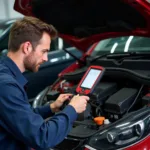A car service is essential for keeping your vehicle running smoothly, safely, and efficiently. But what does it actually entail? In simple terms, a car service is a series of checks and procedures carried out by a qualified mechanic to assess and maintain your car’s overall health.
This article dives deep into the intricacies of car servicing, equipping you with the knowledge to understand the process and make informed decisions about your vehicle’s maintenance.
What Does a Car Service Include?
While the specifics can vary depending on the make, model, age of your car, and the type of service required (interim, full, or major), a standard car service typically covers the following:
Engine Oil and Filter Change
The engine is the heart of your vehicle, and engine oil is its lifeblood. Regular oil changes are crucial to lubricate moving engine parts, reduce friction, prevent overheating, and remove harmful contaminants. The oil filter works in tandem with the oil to trap dirt and debris.
Fluid Level Checks and Top-ups
Your car relies on various fluids like coolant, brake fluid, power steering fluid, and transmission fluid for optimal performance. During a service, the mechanic will check the levels of these essential fluids and top them up as needed to ensure everything is operating within the recommended range.
Tire Inspection and Pressure Check
Tires are your only point of contact with the road, making their condition paramount for safety and handling. The mechanic will inspect your tires for wear and tear, damage, and proper inflation. They’ll also check the spare tire to ensure it’s ready for use in case of an emergency.
Brake Inspection
A well-maintained braking system is non-negotiable for safety. The mechanic will thoroughly inspect your brake pads, discs, and calipers for wear and tear, and advise on any necessary replacements or repairs to guarantee optimal braking performance.
Battery Check
Your car battery provides the electrical current needed to start your engine and power various electrical components. The mechanic will check the battery’s voltage and overall health, cleaning any corrosion on the terminals and advising on replacement if needed.
Air Filter Replacement
The air filter prevents dust, dirt, and debris from entering your engine and potentially causing damage. A clogged air filter can hinder engine performance and fuel efficiency. The mechanic will typically replace your air filter with a new one during a standard service.
Lights Check
Malfunctioning lights are a safety hazard and can lead to fines. The mechanic will check all your exterior lights, including headlights, taillights, brake lights, and turn signals, to ensure they’re working correctly and meet legal requirements.
Additional Checks
Depending on the service package and your car’s specific needs, the mechanic may also perform other checks and procedures, such as:
- Inspecting the drive belts and hoses
- Checking the exhaust system for leaks and damage
- Inspecting the steering and suspension components
- Scanning the vehicle’s computer for diagnostic trouble codes (DTCs)
Why Is Regular Car Servicing Important?
Regular car servicing, as recommended by your manufacturer, offers numerous benefits, including:
- Safety: Ensures your car is roadworthy, reducing the risk of breakdowns and accidents.
- Reliability: Keeps your car running smoothly and reliably, minimizing the chances of unexpected issues.
- Performance: Maintains optimal engine performance, fuel efficiency, and handling.
- Longevity: Extends the lifespan of your car by preventing minor issues from escalating into major problems.
- Resale Value: A well-maintained car with a comprehensive service history commands a higher resale value.
“Regular car servicing is not just about fixing what’s broken; it’s about proactive maintenance to prevent issues from arising in the first place,” says John Smith, a senior automotive engineer with over 20 years of experience. “A well-maintained car is a safer, more reliable, and ultimately, more cost-effective car in the long run.”
How Often Should You Service Your Car?
The general rule of thumb is to have your car serviced annually or every 10,000-12,000 miles, whichever comes first. However, it’s crucial to consult your car’s owner’s manual for the manufacturer’s recommended service intervals, as they can vary significantly between makes and models.
If you frequently drive in harsh conditions, such as extreme temperatures, dusty environments, or heavy traffic, you might need to service your car more frequently.
 Car Service Checklist
Car Service Checklist
Conclusion
Understanding “what is involved in servicing a car” empowers you to take control of your vehicle’s maintenance and make informed decisions that prioritize safety, reliability, and longevity. Remember, regular car servicing is an investment that pays off in the long run, saving you from costly repairs, maximizing your car’s performance, and ensuring your safety on the road.
FAQs
1. What’s the difference between an interim and a full car service?
An interim service is a basic check-up, typically recommended every 6 months or 6,000 miles. A full service is more comprehensive and includes more checks and procedures, usually recommended annually or every 12,000 miles.
2. How much does a car service cost?
The cost varies depending on the type of service, your car’s make and model, and the labor rates at your chosen garage. Get quotes from reputable garages to compare prices.
3. Can I service my car myself?
While basic checks like fluid level checks are doable, it’s best to leave servicing to qualified mechanics with the expertise and equipment to diagnose and fix potential issues correctly.
4. Do I have to go to the dealership for servicing?
No, you can take your car to any reputable independent garage or specialist. However, ensure they use manufacturer-approved parts and follow the recommended service schedule.
5. What happens if I don’t service my car regularly?
Neglecting regular servicing can lead to reduced performance, increased fuel consumption, unexpected breakdowns, costly repairs, and even compromise your safety on the road.
For more information on car servicing costs and tips, check out our articles on:
Still have questions about car servicing?
Contact us via WhatsApp: +1(641)206-8880 or Email: [email protected]. Our dedicated customer support team is available 24/7 to assist you.


